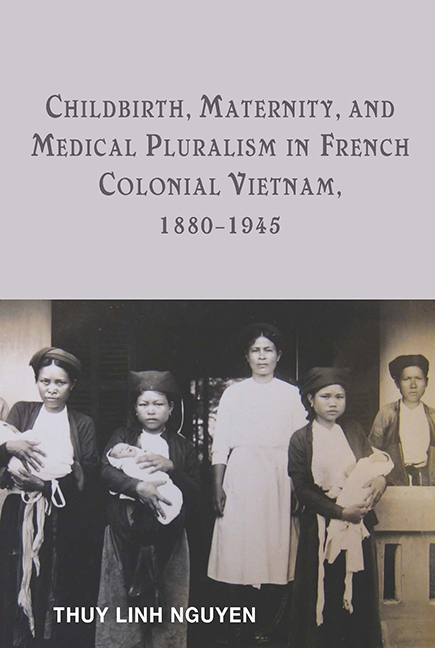Book contents
- Frontmatter
- Contents
- List of Illustrations
- Acknowledgments
- Introduction
- 1 The First Encounters
- 2 Maternity Hospitals
- 3 Colonial Midwives
- 4 The Bà mụ and Childbirth Pluralism
- 5 Scientific Motherhood and the Teaching of Maternity
- 6 The Depression Era and the Discovery of the Child
- Conclusion
- Notes
- Bibliography
- Index
5 - Scientific Motherhood and the Teaching of Maternity
Published online by Cambridge University Press: 13 July 2019
- Frontmatter
- Contents
- List of Illustrations
- Acknowledgments
- Introduction
- 1 The First Encounters
- 2 Maternity Hospitals
- 3 Colonial Midwives
- 4 The Bà mụ and Childbirth Pluralism
- 5 Scientific Motherhood and the Teaching of Maternity
- 6 The Depression Era and the Discovery of the Child
- Conclusion
- Notes
- Bibliography
- Index
Summary
In November 1941, Đàn Bà Mới (New women), a monthly magazine for women in Vietnam, asked its female readers to answer a number of questions that would help determine their “modernist” or “traditionalist” identity. The questions raised by the magazine touched on several aspects of a woman's life, including childrearing. The infant care techniques described by the journal, such as bottlefeeding, regular infant height and weight measurement, separate sleeping rooms, and health checkups for wet nurses, presented a new set of practices that did not fall within the traditional framework of motherhood in Vietnam. If female readers had experience with these infant care methods, they would be considered by the magazine as hiện đại, or modern. Despite its limited scope, the survey offered a good indication of changes that were taking place in motherhood and infant care in Vietnam.
As discussed in chapter 1, Vietnamese traditions entrusted women with domestic affairs and childrearing. During the colonial period, the traditional role of women was challenged by Western notions of gender equality and feminism that promoted education, career opportunities, and greater political and social standing for women. Vietnamese press and intellectuals embraced this movement and hence advocated for the emergence of the modern, new, or civilized woman (hiện đại, mới, tân tiến) whose progressive, modernist vision often contrasted with the Confucian norms of female obedience and filial duty. In the new narrative on the modern woman, family became secondary to a woman's mission to venture out of her domestic domain and excel in education, career, and even politics. According to many progressive authors of the time, motherhood and childrearing were associated with the old or backward group of women (cũ, hủ lậu) whose life was confined to the kitchen (xó bếp) and her bamboo-entrenched village (lũy tre làng). As a result, gender studies of modern Vietnam oft en stress the colonial period as a turning point in Vietnamese women's reassessment of their domestic image, and moreover their daring breakaway from the confining cult of domesticity in order to embrace the more challenging but liberating realm of politics and social affairs. In his book Vietnamese Traditions on Trial, David Marr asserts that “during thirty years of life-and-death struggles against the French, traditional female attributes …
- Type
- Chapter
- Information
- Publisher: Boydell & BrewerPrint publication year: 2016
- 1
- Cited by



